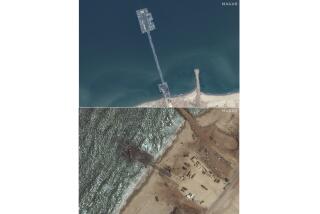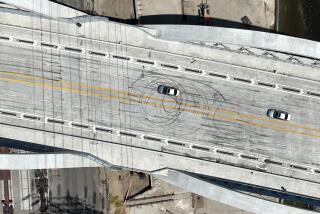Proud islanders wary of first bridge
- Share via
TUTI ISLAND, SUDAN — The stalwart people of this tiny, crescent-shaped island have fought off invasions from mainland Khartoum for more than 700 years.
Early settlers of Tuti, nestled at the confluence of the White Nile and Blue Nile, relied on the rushing river to fend off hostile tribes. As Khartoum grew into Sudan’s bustling capital, residents here clung to their cultural isolation, striving to maintain the feel of a sleepy farming village, even though their island is just a stone’s throw from downtown.
Proud and sometimes aloof, Tutians for decades rebuffed attempts by the Sudanese government to modernize the island, which lies within the city limits of Khartoum. There are almost no cars and only one paved road on the 15,000-resident island. People walk, ride donkeys or use golf-cart-like rickshaws. A rusty ferry is the only link to the rest of the big city.
Soon, however, construction will be completed on a 200-yard suspension bridge, and the new roadway is bringing something from the modern world that may finally wear down that renowned Tuti resistance: money.
Real estate values on this impoverished, dust-choked island are soaring, and families whose Tuti roots date back hundreds of years are facing a tough choice between preserving their distinctive lifestyle and reaping a windfall profit.
On the narrow dirt roads and in the tiny markets of Tuti, locals who once gossiped about upcoming marriages on the island or speculated about seasonal floods now swap stories about land values: who is buying, who is selling and how much they got. Families that for generations eked out a modest living as farmers will soon count themselves among the city’s richest.
Prices 15 years ago were less than $10 per square meter. Today, land sells for an average of $300, with current asking prices as high as $650. After the bridge is completed this year, investors predict square-meter prices will top $1,000, ranking the island among the costliest neighborhoods in Khartoum.
Abdul Abdelhamid Ahmed, 57, a professor of veterinary science, holds no romantic illusions about life on an island. He complains about the daily hassles of the ferry and walking long distances to reach his job in mainland Khartoum. He’s looking forward to the day when the bridge opens so he can drive to his doorstep. But when asked if he’d ever move, Ahmed said, “My family has lived here for 700 years. How could we leave?”
What if someone offered him $500 a square meter, about 10 times the price he paid a decade ago when he moved to a bigger plot on the island?
“I’d take it,” he said with a smile. But, he added, he’d use the money to buy another plot of land on the island, or else move to another part of Khartoum and buy a small business.
His son is lobbying hard for a sale. “Tuti is great, but I want to see new things,” said Ahmed Abdelhamid, 22.
Tuti’s surge has resulted from Sudan’s oil boom, which has transformed Khartoum into a destination for billions of dollars in national and foreign investment.
Despite U.S. economic sanctions intended to protest the deadly conflict in Darfur, developers from China and the Persian Gulf have made Sudan one of Africa’s most thriving economies.
Tuti finds itself on the edge of the nation’s most ambitious multibillion-dollar project: a collection of skyscrapers and office towers. On the city side, the new Tuti Bridge will terminate at one of the city’s latest landmarks, the egg-shaped Burj Al-Fateh Hotel built by Libyan investors and due to open this year.
Planners envision Tuti as a playground for tourists and wealthy Sudanese, replacing mango groves and wetlands with golf courses, casinos, five-star resorts and luxury apartment towers. Plans to construct two additional bridges connecting Tuti will turn the island into a giant traffic circle, creating shortcuts to Khartoum’s three major districts.
“This is the new Tuti,” said Al Fatih Abouda, president of Tuti Island Investment Co. The budding Donald Trump bought a plot of land 15 years ago as a vacation spot and quickly realized the island’s development potential. Now he calls himself Tuti’s biggest landowner, holding 15% of the island’s real estate.
Inside his slick, blue-glassed office, which stands in stark contrast with Tuti’s brick- and mud-walled homes, there are models and sketches of the island’s planned new look.
At first, Abouda said, island residents were skeptical. That was an understatement. Mobs besieged his office and tore down his company billboard.
Now Abouda is working to organize islanders into a jointly owned entity that will oversee development plans and exchange their land for stock shares in the overall project.
He said residents are warming to the idea. “I haven’t got [Tutian] nationality yet, but I’m welcome,” he said with a laugh.
People on the island express emotions ranging from skepticism to excitement. Many say they are looking forward to the bridge opening, but have concerns about Abouda’s investment plans and worry about the effect on the island.
“We have a very strong social system on Tuti and we want to preserve our distinct culture,” said Omer Yussuf, 62, an anthropologist and Tuti native. “We are not against change. But we want it to be directed and organized, not just left to market forces.”
Government officials insisted they would not permit overdevelopment and emphasized that no residents would be forced to move off the island. “We want to protect the beauty and the greenness of the island,” said Khartoum State Gov. Abdel Halim Mutaafi, chief administrator of the capital.
With an eye toward collecting future tax revenue from Tuti, the government funded the $16-million bridge. But residents complain there have been no infrastructure improvements, such as new roads or parking to handle an influx of cars.
Ahmed Mohammed, a Tuti accountant and father of six, said rising real estate values are already altering islanders’ attitudes and priorities. Villagers planned to build a soccer field for children, but with prices at more than $1 million an acre, the idea was shelved. “We’ll never get that now because the land is too dear,” Mohammed predicted. He said resentment among some residents was growing. “Everybody wants a good life,” he said. “But we get very angry at those who sell.”
Some vow they’ll never leave. Rising from an afternoon nap on a wooden bench in Tuti’s central market, Abdelrahman Sadiq, 70, said no price would tempt him to give up his modest house. “Even if they offered me the sky,” he said.
A generation ago, he said, a debate about the development of Tuti was unthinkable. Dating back to the British colonialists, regimes in Khartoum had tried and failed to exploit the island. Electricity and fresh water came in the 1960s. But until this time, attempts to build a bridge were always met with protest.
As the capital urbanized, the island, whose inhabitants were the first settlers of Khartoum, remained a close-knit, closed community. It’s still a place where everyone knows everyone, and at weddings and funerals, practically the whole island turns out.
“Even though they live in the middle of Khartoum, it’s an isolated culture,” said Mohammed Elmuntasir Ahmed, an environmental engineer at University of Khartoum.
His college roommate came from Tuti, he said, “and in five years, he never once invited me to his house. That’s Tuti,” Ahmed said. “But the bridge is going to change the picture. I think this generation could be the last.”
--
More to Read
Sign up for Essential California
The most important California stories and recommendations in your inbox every morning.
You may occasionally receive promotional content from the Los Angeles Times.













